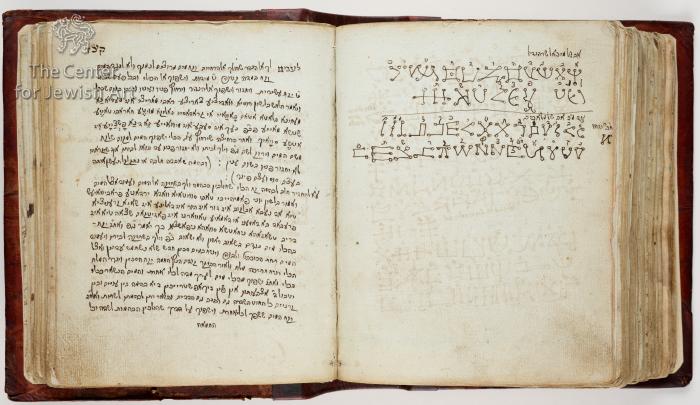
The following description was prepared by William Gross:
This truly exceptional kabbalistic manuscript comprises a broad collection of practical Kabbalah stemming primarily from a wide variety of medieval Jewish sources. In both its rich textual content and its inclusion of some extraordinarily rare kabbalistic drawings and diagrams this is an outstanding collection of Jewish mystical magic and by far the most important manuscript of its kind throughout the Eastern- and Central-European Ashkenazic territory. The collection includes nearly three thousand kabbalistic formulae or recipes, a veritable wealth of practical kabbalistic praxis. Most of the material found in the manuscript has been arranged alphabetically(". 1r-184v. The balance of the volume is composed of numerous prescriptions for the preparation of amulets (f. 201r), instructions for fashioning magical rings (f. 189v), goralot (" . 190v-192v), and the mysteries of the Menorah (folio 224r-v). Among the unique elements found in this manuscript is a recipe for creating an “Adam Golem,” including details unknown from any other source. Many
of the formulae consist of kabbalistic and magic folk medicine, often invoking a variety of divine names. Although written mainly in Hebrew, from time to time one can # find words, and even brief passages in Yiddish, and many words of medical and folk medicine elements in Ukrainian. The manuscript also makes fairly extensive use of angelic script. This volume contains an extremely early (perhaps the earliest) reference to Israel Ba‘al Shem Tov, the founder of Hasidism. The Besht is mentioned, in connection with a specific # c kabbalistic formula, which deals with the safeguarding of one’s home.
Near the end of the eighteenth century, the manuscript was in the possession of the Radvil family (f.200r), and may very well be an authentic transmittal of a kabbalistic technique used by the Besht himself. A detailed description of the vast quantity of
kabbalistic formulae in this collection must await a complete and comprehensive scholarly analysis of the present volume. As much of the included material may not be found elsewhere, the particulars of each entry shed light on early Hasidic Kabbalah, while as a whole, the manuscript is an extremely important example of the variety of mystical traditions practiced during the period of nascent Hasidism in Ukraine. No other manuscript of this genre so significantly bears witness to the breadth of Ashkenazic
familiarity with this form of mystical magic as does the present work. It should be considered as one of a very few, select manuscripts of its kind. While others in this small exclusive group, such as Sassoon MS 290, or Shorshei ha-Shemot by Moshe Zacuto, (MS. Laniado), represent distinct forms of magic more characteristic of the Spanish Jewry patrimony, this work remains unparalleled in the Ashkenazic context.
267 leaves



